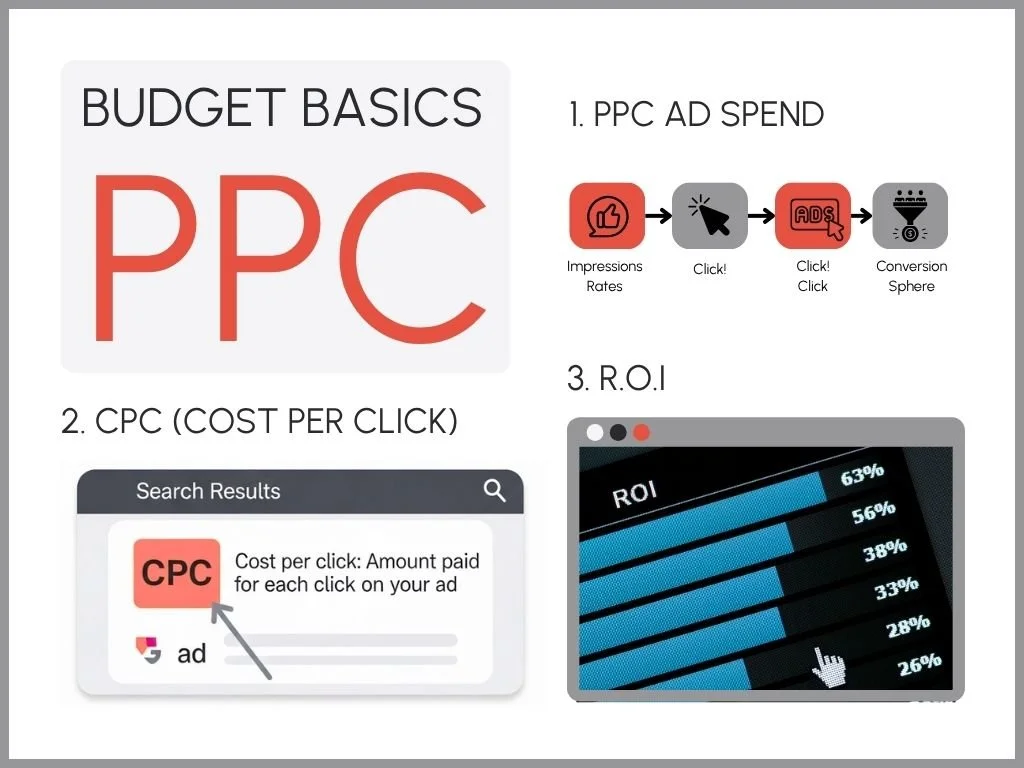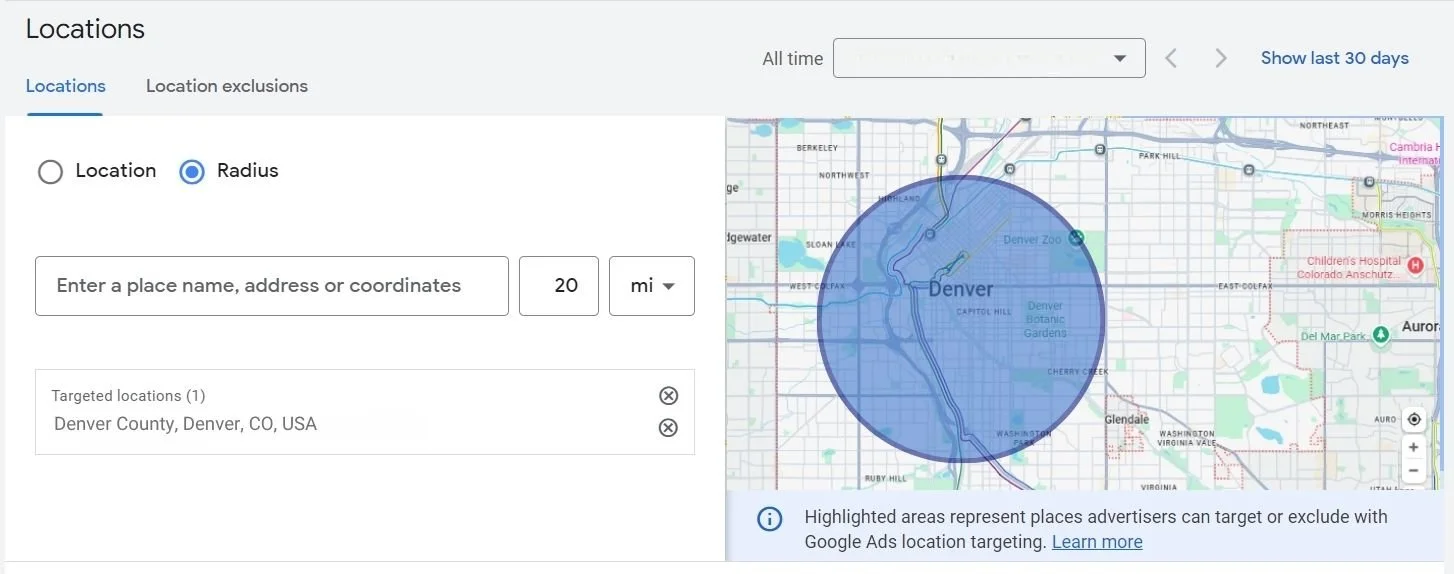Effective PPC Budget Allocation Strategies for Small Businesses in Denver
Let’s not pretend you haven’t thought about just setting your PPC budget to something that “feels right” and hoping for the best. That weird $547.89 figure in your Google Ads account didn’t come from strategy — it came from guesswork, gut feelings, and maybe a YouTube video from 2019.
You’re not alone.
Denver’s small business scene is filled with smart, relentless people who know how to grind — but when it comes to digital ad spend, most are either overpaying for underperforming clicks or playing it so safe they may as well not be playing at all.
Here’s the good news, though: you don’t need to spend more. You need to spend smarter — and yes, that applies even if your “team” is you, your cousin, and a Google Sheet.
This is how real Denver businesses can stop wasting and start winning.
Understanding PPC Budget Basics
A lot of small businesses treat their PPC budget like it's just another line on an expense sheet. Rent. Wi-Fi. Google Ads. Same vibe, right?
Well, that’s how they burn through $1,500 in a month… with 17 total clicks to show for it. Two were from bots. One was probably you testing your own ad.
PPC is not some abstract marketing tax. It’s a cash-powered auction where attention is the currency. And PPC in Denver isn’t casual. You're not just bidding for clicks — you're bidding against dentists, realtors, gyms, and that one new gluten-free bakery with a budget five times yours and an agency on speed dial.
But here’s what most don’t hear: the cost of PPC isn’t just money out—it’s feedback in. Every click you buy teaches you something. But only if you’re paying attention.
Let’s decode the core terms people throw around like everyone’s born with a Google Ads certification:
PPC ad spend: Your literal out-of-pocket. Every cent you let Google eat.
CPC (cost per click): The toll you pay for someone to tap your ad instead of your competition’s.
ROI: The math that determines whether you're scaling or subsidizing your own failure.
And no, your cousin’s viral TikTok doesn’t count as digital strategy. For Denver-based businesses especially, this stuff hits different. Local ads let you target real people in LoDo or Wash Park, instead of spraying dollars across the state like you're running for mayor.
Here’s the thing: if you want results, treat your PPC budget like a portfolio. And if math isn’t your love language, a decent PPC agency for small business can help make sense of it. Or at the very least, stop the bleeding.
Setting Clear Goals for Your PPC Campaigns
Vague goals kill ad budgets faster than bad headlines.
“I just want more traffic” is not a goal. It’s a guess wrapped in hope. PPC isn’t magic. It’s math. If your ad spend doesn’t point directly to something measurable, you’re lighting dollars on fire and calling it marketing.
Tie Your Budget to Real Outcomes
Here’s what matters: specific, objective-aligned, measurable goals. If you’re a local bakery in RiNo, then don’t advertise to someone in Longmont who won’t drive 45 minutes for sourdough. Try “increase foot traffic from ZIPs 80205 and 80218 by 15% this quarter.” That’s a goal. Now we can work with it.
Your PPC budget isn’t meant to fund Google’s Q4 earnings. It’s supposed to create actual outcomes — phone calls, sales, foot traffic, booked services. Period. So if you're not working with a PPC agency for small business that gets this — and gets Denver — you’re probably aiming at the wrong metric.
Make It SMART or Scrap It
Use the SMART format. Yes, it's cliché. No, you shouldn’t ignore it. Specific, Measurable, Achievable, Relevant, Time-bound. Miss one and the whole budget goes soft.
A Denver-based e‑commerce skincare brand sets a goal to "increase online sales of its best-selling serum by 20% in 30 days via a Google Ads campaign targeting users aged 25-45 within 10 miles of 80211.” Every piece of that sentence is accountable. That’s how you run PPC.
And businesses that do this are 376% more likely to report “high satisfaction” with PPC outcomes. That’s what happens when goals stop being vibes and start being numbers.
Budget Allocation Strategies for Small Businesses
Starting your ppc budget at $500/month might feel small—until you're flipping that same spend into twice the conversions other local shops are paying triple for. That’s the leverage you want. Begin modestly, track performance like a hawk, then scale what works—don’t pour gasoline on suspicion.
Begin Small, Grow Responsibly
Set $500 aside for your first month. Let search ads, especially branded + Denver-focused terms, take 60–70% of that. Why? Because search delivers intent. People typing “Denver dog groomer near me” usually want teeth brushed yesterday. Let testing get the remaining 20–30%—like display, or dabbling in social ads via your digital marketing company. Small bets, then double down on winners.
This mirrors real results: businesses using conservative budgets with smart segmentation saw 35% better ROI within 90 days compared to flat allocations. Ridiculously effective, ridiculously underused.
Segment Campaigns Carefully
Divide your budget:
60–70%: dependable campaigns (search ads targeting high-value keywords)
20–30%: experiments—display, remarketing, social
10%: moonshots (like trying non-branded “Denver events” during March Madness)
By doing this, you'll systematically kill weak campaigns and multiply winners—no gut feelings, no introspective guesswork.
Geo-Target like You Mean It
Denver isn’t one city. It splits into dozens of neighborhoods, each with different cost of ppc. Highland bids might hover around $1.80; Cherry Creek, $5.20. Pause geo=Denver-wide. Create zones: Beltline gets X bid, Capitol Hill gets Y. That local specificity cuts wasted spend and aligns with your CPM—not someone else’s.
Do Seasonal Shifts
Retailers around Denver know this: November–December CPCs climb by 40% thanks to holiday buying. Shift your ppc ad spend accordingly—boost budgets pre‑thanks early, pull back February/March, then gear up for summer events and back‑to‑school. Adjusting one quarter at a time avoids throwing money at underperforming ads. It’s strategic, not reactive.
A/B Test Everything
“We’ll test later” is code for “we’ll never optimize.” Run at least two versions of ad copy. Maybe mention "free local pickup" vs. "same-day delivery in Denver." See which keywords perform. Use findings to shift ppc campaign optimization monthly. Every tweak improves CTR, lowers CPC, adds oomph to your ROI.
Tools and Tactics for PPC Campaign Optimization
Now you know how much and where—here’s how to keep it sharp.
Leverage Smart Tools
Google Ads Keyword Planner helps local targeting by suggesting how often "Denver yoga class" gets searched. Use it weekly—don’t treat it like Instagram. And for tracking conversions and ROI, Google Analytics is non-negotiable. Tie it to your ad account and check if those clicks turn into calls, form fills, or sales.
Protect Your Budget with Negative Keywords
You want clicks from someone ready to spend—not someone researching "what is PPC?". Drop generic terms like "definition" or "training" as negative keywords. On average, 10–20% of clicks on ondemand ppc ad spend can be irrelevant, hovering around 100+ wasted clicks monthly on low-value terms. This is basic ppc campaign optimization, but somehow most local shops skip it.
Schedule Ads at Peak Times
In Denver, people surf Google differently than in Chicago. Optimize your ad delivery schedule—prioritize Thurs–Sun evenings when local hangout searches spike. Drop slots at 2 a.m. unless you're selling sleep masks. This keeps your ppc budget focused on moments that matter.
Use Automation Wisely
Smart digital marketing company partners often recommend automated bidding like Target CPA. Fine—set it with a solid CPA target, based on your own historical conversion data. But don’t let automation run blind. Check twice monthly and cap budgets to avoid runaway bids.
When to Consider a PPC Agency for Small Businesses
Let’s not sugarcoat it: DIY PPC is romanticized nonsense. You’re told it’s "easy"—just throw in some keywords, set a ppc budget, and hit launch. Great. Now try untangling the dumpster fire of irrelevant clicks, missed conversions, and Google's “recommendations” that conveniently inflate your ppc marketing cost.
You Know You Need Help If…
Your ROI is more elusive than Denver parking on a Friday night. You’re spending hours in ad dashboards and still don’t know what a negative keyword is. Or maybe you’ve had the same broad match keyword bleeding your ppc ad spend since last fall and didn’t realize it until now.
Here’s the thing: knowing when to tap out is logic. Especially when your time, energy, and revenue depend on it.
Why an Agency Isn’t Just for “Big Guys”
A legit ppc agency for small business isn’t throwing you into some cookie-cutter campaign template. A good one breaks your market into chunks, knows the zip codes that click but don’t buy, and calls out Google’s nonsense in real-time. For more ways to sharpen your digital strategy beyond PPC, check out these tips from a Denver marketing agency.
Local PPC in Denver isn’t national PPC. The digital marketing company down the street sees your competitors daily. They know what’s overbidding on RiNo yoga classes and what’s undervaluing Highlands brunch reservations. That’s not strategy in theory—that’s contextual leverage.
And cost? Good agencies pay for themselves. You’re not just buying time—you’re reclaiming profit. According to Clutch, businesses that outsource PPC see a 27% lift in return on ad spend within 90 days. That’s a hard line between barely surviving and steadily scaling.
Conclusion
Look, PPC isn’t hard. What’s hard is not wasting money doing it wrong. That’s why your ppc budget needs discipline, not guesswork.
Start small. Test fast. Track everything. Don’t fall in love with your ad copy. Cut what doesn’t convert. Push what does. That’s ppc marketing services at its core—relentless testing, zero ego, and a refusal to pay Google for air.
If you’re in Denver and tired of donating your margins to keywords that barely pull leads, maybe it’s time. Get real help. We’re a digital marketing company that doesn’t just understand ads. We understand this city. We know its quirks, its habits, and its click-to-call ratios by neighborhood.
So whether you’re bleeding budget or just tired of spreadsheets, book a consultation with Rathcore. We’ll either fix it or tell you why it’s broken. Either way, you win.
Frequently Asked Questions
-
A: A PPC budget is the amount of money a business sets aside for pay-per-click advertising over a specific period—daily, weekly, or monthly. It determines how often your ads appear and how much you’re willing to pay for clicks. In small business campaigns, especially with PPC in Denver, it’s essential to start with a controlled budget and scale based on real performance, not guesses or inflated platform suggestions.
-
A: A PPC daily budget is the maximum amount you're willing to spend on ads each day. Platforms like Google Ads use it to throttle how often your ads show in a 24-hour period. While it's not a hard cap—spend may fluctuate slightly—it helps you control PPC marketing cost and avoid blowing through your monthly budget early. For small businesses, setting a daily limit ensures steady pacing and more accurate campaign optimization.
-
A: In finance and digital marketing, PPC stands for "pay-per-click." It’s an advertising model where you’re charged each time someone clicks your ad. The goal is to generate traffic and conversions efficiently, especially in local campaigns like PPC in Denver. Unlike CPM (cost per thousand impressions), PPC only spends when there’s action, making it popular for businesses that want direct ROI tracking and budget-controlled campaign strategies.
READ MORE…
Tips from a Denver Marketing Agency to Grow Your Business Online




